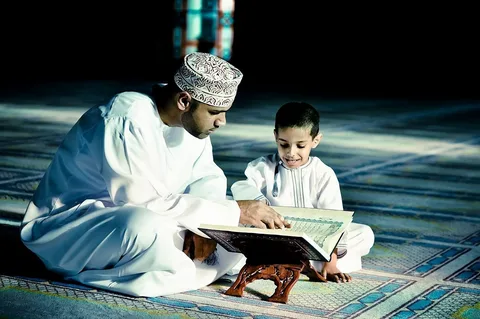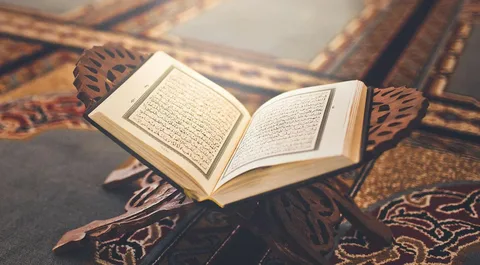ayats about parents, In the vast tapestry of Islamic teachings, the Quran dedicates significant verses to the sacred relationship between parents and children. These ayats not only emphasize the fundamental principles of respect and obedience but also delve into the nuanced aspects of compassion, guidance, and gratitude towards parents.
ayats about parents

In Islam, parents are accorded great respect and importance. The Quran contains numerous verses that emphasize the significance of honoring and obeying one’s parents. Here are a few ayats (verses) related to parents:
Ayats Highlighting Parental Respect
The Quran, in its profound wisdom, lays the foundation for a harmonious family by highlighting the paramount importance of respecting parents. Surah Al-Isra (17:23) succinctly encapsulates this message, stating. “Your Lord has decreed that you worship none but Him and that you be kind to parents.” This ayat establishes the link between worshiping the Almighty and showing kindness to parents, underscoring the significance of parental respect in the Islamic framework.
Ayats on Parents’ Role in Guidance
In the journey of life, parents serve as the guiding lights, steering their children through the complexities of the world. Surah Luqman (31:14) beautifully captures this sentiment. “And We have enjoined upon man [care] for his parents. His mother carried him, [increasing her] in weakness upon weakness. and his weaning is in two years. Be grateful to Me and to your parents; to Me is the [final] destination.” This verse not only acknowledges the sacrifices of parents but also emphasizes gratitude towards them as an expression of devotion to Allah.
Ayats about Kindness and Compassion
Islam promotes a culture of kindness and compassion, especially towards parents. Surah Al-Ankabut (29:8) advocates for such behavior, stating. “And We have enjoined upon man goodness to parents. But if they endeavor to make you associate with Me that of which you have no knowledge. do not obey them. To Me is your return, and I will inform you about what you used to do.” This ayat underscores the balance between filial respect and the ultimate obedience to Allah.
Ayats about Dua for Parents

The Quran encourages believers to supplicate for the well-being of their parents. Surah Al-Baqarah (2:201) reinforces this concept, “And of them are some who say, ‘Our Lord, give us in this world,’ and they will have in the Hereafter no share. And of them are some who say, ‘Our Lord, give us in this world [that which is] good and in the Hereafter [that which is] good and protect us from the punishment of the Fire.” This ayat highlights the significance of including parents in prayers, seeking both worldly and spiritual blessings for them.
Ayats on Patience in Dealing with Parents
Dealing with the challenges posed by parents requires patience, and the Quran acknowledges this reality. Surah Al-Isra (17:24) advises, “And lower to them the wing of humility out of mercy and say, ‘My Lord, have mercy upon them as they brought me up [when I was] small.'” This verse not only emphasizes humility but also seeks the mercy of Allah for parents, recognizing the trials of upbringing.
Ayats on Parents’ Rights
The Quranic verses elaborate on the rights that parents hold over their children. Surah Al-Ankabut (29:9) declares, “But those who believe and do righteous deeds – We will surely admit them among the righteous [into Paradise].” This ayat underscores the correlation between righteousness, belief, and the admission of individuals into Paradise, emphasizing the integral role parents play in nurturing righteousness.
Ayats about Serving Parents
Acts of service and gratitude towards parents are highly regarded in Islam. Surah Al-Isra (17:25) states, “My Lord, make me an establisher of prayer, and [many] from my descendants. Our Lord, and accept my supplication.” This ayat reflects the desire for continuity in righteous actions, indicating that serving parents is a virtuous deed with far-reaching consequences.
Ayats on Ingratitude towards Parents
While Islam extols the virtues of gratitude towards parents, it sternly warns against ingratitude. Surah Al-Ankabut (29:15) admonishes, “But if they endeavor to make you associate with Me that of which you have no knowledge, do not obey them.” This ayat draws a clear line, emphasizing that obedience to parents should not compromise one’s allegiance to Allah.
Ayats on the Consequences of Disrespecting Parents
The consequences of disrespecting parents are outlined in the Quran to serve as a deterrent. Surah Al-Ankabut (29:68) states, “And who is more unjust than one who invents a lie about Allah or denies the truth when it has come to him? Is there not in Hell a residence for the disbelievers?” This verse establishes the severity of falsehood and denial, particularly when it involves misrepresenting or disrespecting one’s parents.
Ayats on Parents’ Place in Paradise
The Quran elevates the status of parents in the afterlife. Surah Al-Ahqaf (46:15) emphasizes, “And We have enjoined upon man, to his parents, good treatment. His mother carried him with hardship and gave birth to him with hardship, and his gestation and weaning [period] is thirty months. [He grows] until, when he reaches maturity and reaches [the age of] forty years, he says, ‘My Lord, enable me to be grateful for Your favor which You have bestowed upon me and upon my parents and to work righteousness of which You will approve and make righteous for me my offspring. Indeed, I have repented to You, and indeed, I am of the Muslims.'” This ayat not only highlights the challenges of parenthood but also underscores the continuous cycle of gratitude and righteousness.
Recommend: most powerful surahs in quran
Ayats on Parental Responsibilities
Parental responsibilities are outlined in the Quran to guide parents in fulfilling their duties. Surah Al-An’am (6:151) states, “Say, ‘Come, I will recite what your Lord has prohibited to you. [He commands] that you not associate anything with Him, and to parents, good treatment. And do not kill your children for fear of poverty. We provide for you and for them. And do not approach immoralities – what is apparent of them and what is concealed. And do not kill the soul which Allah has forbidden, except by right. This has He instructed you that you may use reason.'” This ayat underscores the prohibition of associating partners with Allah and emphasizes the fundamental duty of treating parents with kindness.
Ayats on Equal Treatment of Parents
Equality in treatment between parents is highlighted in the Quran. Surah Al-Ankabut (29:8) states, “And We have enjoined upon man goodness to parents. But if they endeavor to make you associate with Me that of which you have no knowledge, do not obey them.” This ayat not only reiterates the importance of goodness towards parents but also emphasizes the equal treatment of both, even in the face of potential deviation from the path of righteousness.
Ayats on Seeking Forgiveness for Parents
Forgiveness for parents is a recurring theme in the Quran. Surah Al-Isra (17:24) states, “My Lord, have mercy upon them as they brought me up [when I was] small.” This ayat emphasizes the plea for mercy for parents, recognizing the challenges they faced in upbringing and nurturing.
Read about: quran about sadness
FAQs
Are there specific ayats that highlight the consequences of disrespecting parents?
Yes, Surah Al-Ankabut (29:68) outlines the severe consequences of inventing lies about Allah or denying the truth, particularly when it involves disrespecting parents.
How does Islam view the equal treatment of both parents?
Islam emphasizes goodness and equal treatment towards both parents, as highlighted in Surah Al-Ankabut (29:8).
What role do parents play in the afterlife according to the Quran?
Surah Al-Ahqaf (46:15) elevates the status of parents, emphasizing good treatment and continuous gratitude in the afterlife.
Are there specific ayats guiding believers on supplications for their parents?
Yes, Surah Al-Baqarah (2:201) encourages believers to include prayers for the well-being of their parents in both worldly and spiritual aspects.
How does the Quran address the responsibilities of parents towards their children?
The Quran, in Surah Al-An'am (6:151), outlines the fundamental duty of parents to treat their children with kindness and prohibits the killing of children for fear of poverty.
Conclusion
In conclusion, the ayats about parents in the Quran weave a tapestry of values crucial for fostering strong family bonds. From emphasizing respect and kindness to delineating the consequences of ingratitude, these verses provide a comprehensive guide for navigating the intricate dynamics of parent-child relationships. The Quranic teachings underscore the profound impact of parental influence on an individual’s spiritual journey, highlighting the path to righteousness through acts of love, service, and gratitude.

